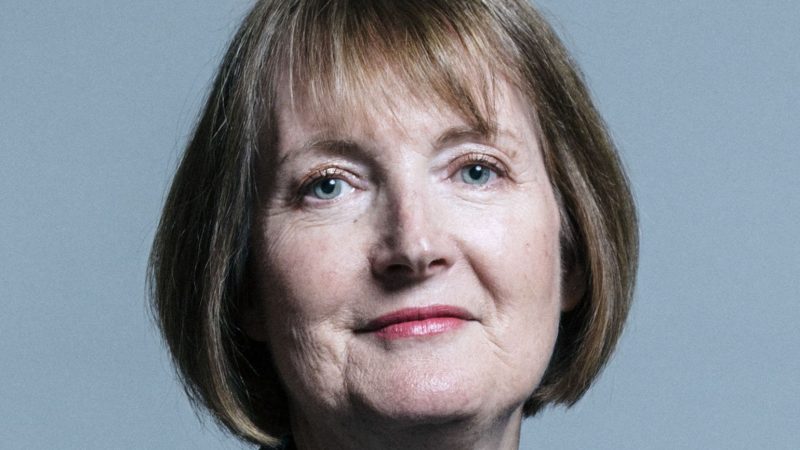'“Trailblazer”, “Glass ceiling smasher”, “Inspiration” are just some of the descriptions of her being shared by Labour colleagues'

Melanie Ward is Women’s Officer for Peckham Rye Branch Labour Party; served for 6 years on the Labour Women’s Network leadership committee; and is Chair of a global feminism NGO.
Harriet Harman has many achievements to be proud of. Cabinet Minister, Chair of the Labour Party, Deputy Leader of the Labour Party – and her part in creating change like the establishment of Sure Start, the minimum wage and laying the groundwork for equal marriage through civil partnerships.
“Trailblazer”, “Glass ceiling smasher”, “Inspiration” are just some of the descriptions of her being shared by Labour colleagues since she announced that she will be standing down as MP for Camberwell and Peckham at the next General Election. They are accurate. And it is Harriet’s groundbreaking achievements for women that mean the most to so many of us women activists across the Party, including in her own CLP.
I attended numerous Labour Party Women’s Conferences when Harriet was Deputy Leader – whenever she came to speak, she received such lengthy standing ovations that she always seemed almost embarrassed by the natural, spontaneous and tangible depth of warmth and gratitude that we as the women’s movement in the room showed towards her. She did not receive this reception out of politeness but out of the often unvoiced understanding of what she has done for us.
Being willing to be the first so that others may follow in your footsteps is an extraordinary contribution to make. I can scarcely imagine the kind of hostility that Harriet must have faced almost 40 years ago when she was pregnant and stood for selection, and then in the by-election, in what was then Peckham constituency. To do that – to fight for your place and then be elected as a pregnant feminist MP into a House of Commons that was 97% men in 1982 – must have taken incredible guts and grit.
But Harriet continued as she started, making pioneering changes that were then radical, such as setting up the first women’s Parliamentary Labour Party group. In 1997, she became the first Minister for Women at a time when, she has said, this agenda was regarded by the rest of Whitehall as “an annoyance” and something “to be protected from” – but she prioritised childcare, domestic violence and women’s representation, making massive practical advances for women. The term ‘Father of the House’ has been used for the longest-serving male MP since 1816. It took until 2017 for Harriet as a woman MP to be given the first to be given the equivalent title of ‘Mother of the House’.
Each of these actions and achievements, in the face of vocal misogyny, hostility and ridicule at the time, must have taken enormous strength and resilience. But she kept on going. Harriet’s determination to make change happen has advanced women’s equality not just in politics but for women across the UK.
From campaigning for All Women Shortlists in the 1990s which have been so successful in equalising the numbers of male and female Labour MPs that, ironically, Labour may no longer be able to use them; to being the architect of the Equality Act in 2010; to pushing through proxy voting for MPs on parental leave; to changing the law to end the use of the ‘rough sex defence’ used by male killers of women when the woman was, as Harriet said, “unable to say anything in her own defence.” Women’s contributions are too often missing from our Party’s historical narratives, and it is worth reading her book, ‘A Woman’s Work’, to learn more.
In October this year, some of the branches in Camberwell and Peckham CLP rearranged our meetings so that we – especially the women members – could come together to meet with Harriet about women’s safety. This was in the wake of the murders of Bibaa Henry, Nicole Smallman, Sarah Everard and Sabina Nessa. It followed the sentencing of a serving police office for Sarah Everard’s murder, and ludicrous advice from the Metropolitan Police that the response of women stopped by a male police officer she didn’t trust should be to flag down a bus. Having once again put her head above the parapet to – rightly – demand the resignation of Metropolitan Police Commissioner Cressida Dick because sweeping change is needed as women’s confidence in the police has “been shattered”, the meeting was vocal in its support for Harriet’s stance. Hopefully Labour’s new frontbench will now take up this call in demanding fundamental change on women’s safety and at the Met.
Harriet Harman is not going anywhere yet; there will be many months until the next election. It seems unlikely that her contribution to public life will cease then. But, as the Labour movement – especially the Labour women’s movement – today seems an important moment to step back and recognise that there may be miles left to travel but because of her courage, determination and willpower, we have come a very long way on women’s equality.
Today, we simply say to Harriet: thank you.
To reach hundreds of thousands of new readers we need to grow our donor base substantially.
That's why in 2024, we are seeking to generate 150 additional regular donors to support Left Foot Forward's work.
We still need another 117 people to donate to hit the target. You can help. Donate today.



